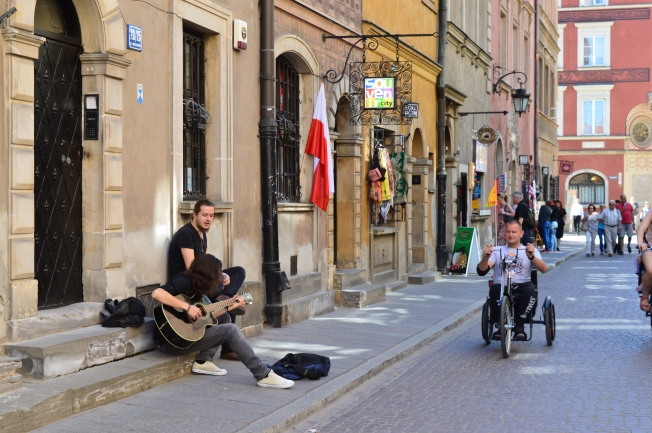The first time I visited Warsaw was in October 2012 for a wedding. On a morning trip to the Old Town, a bleak sky took a little life out of the town buildings, merging their pastel colours into a blend of blandness. If you closed your eyes and listened to sounds of horse hooves clomping on the cobbled streets, you could imagine being in the era of Soviet rule, hunched figures hurrying through the drizzle to buy their bread before rushing back home to their duties. Driving to the local salon to get my hair done for the ceremony, I remember pulling up outside a run-down building with peeling paint, the smoking staff scowling up at the cloudy sky. The weather had dimmed the mood of the town and its subsequent memorability.
Fast forward to June 2015 and I was back in the capital on a brighter day. Driving past the hair salon, the sun shone on a freshly-painted building complete with a new sign and clean windows. Traffic levels boomed on the long weekend as people drove into the capital for a sunny day out. Status appears to be important in Poland as it strives to distance itself from its Communist connotations and develop into a more prosperous country with a greater preference for Western lifestyles. If you have money, you buy a fancy car. Branded clothing and accessories are sought after here. While many Londoners dream of a country mansion where they can work from home and avoid the urban grind, city life seems to be the ideal among many in Poland because it’s seen to indicate a certain status.
It never ceases to amaze me how influential the sun can be psychologically on one’s attitude towards a place. Summer scenes were vastly different from those I had seen in the autumn nearly three years ago. Approaching the Old Town, the buildings stood strikingly against the perfect blue sky, looking incredibly rich in colour like skin bronzed from the sun’s rays. Tourists in shorts and dresses ambled around slowly in a warm state of relaxation, the only sense of rush in the area being from the kids jumping around in excitement trying to pop the bubbles that ballooned from a man’s bucket. There was more energy around the place since I was last there, but less tension at the same time. People moved slower, but more progressively too.
A group of runners milled around doing calf stretches and lunges as we looked for a restaurant to eat at. Zapiecek made traditional Pierogi – deep-fried dumplings stuffed with cheeses, vegetables or meats. Sat outside under white umbrellas, little conversation was exchanged between diners. Instead, people sat lazily, smoking pensively or reading the newspaper. I drank a dried fruit compote whilst the waitresses stood in the doorway in their red and blue aprons, basking in the sunshine. 

Then, as I was eating, a young girl of about 12 approached our table and asked for some change, none of which I had. Seeing her be ignored by the diners around me made me feel slightly uncomfortable. I thought about how increased prosperity makes members of society change their perspective towards the lesser fortunate. It made me think of those real-life rags-to-riches stories you hear about, and question whether these people stay humble or not.
Destroyed by the Nazis during the Second World War, Warsaw has had to renovate itself dramatically. It doesn’t have the number of tourist attractions or social venues to be found in London, but I find that this simplicity makes the capital attractive. Hopefully the increasingly Westernised perspective that the country now holds towards consumer and lifestyle choices won’t make it sacrifice the quiet, modest charm of areas like the Old Town for big brands and brash buildings.




